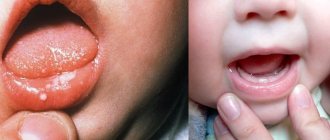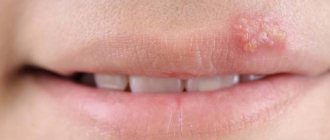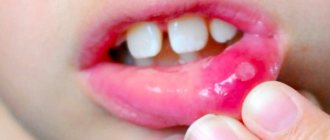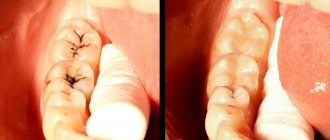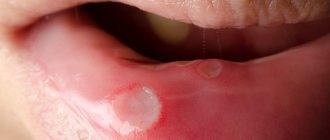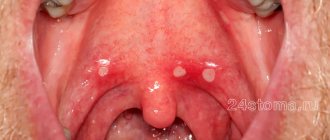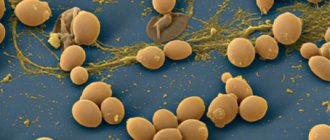What kind of pathology is this
Herpetic gingivitis is an inflammatory lesion of the gums caused by the introduction of a herpes viral infection into their mucosa. This infection is considered highly contagious and can be contracted anywhere, on the street and in public places. During the cold season, there are more cases of this infection. Its source is a sick person. Often this disease becomes a complication of viral stomatitis.
The virus is transmitted to children in the following ways:
- contact;
- household;
- airborne;
- hematogenous.
The first introduction of the virus into the baby’s body is manifested by gingivitis and stomatitis.
Causes of viral stomatitis
The occurrence of the disease is caused by a complication of the primary disease (chickenpox, herpes, etc.). The following may cause signs of the disease:
- poor oral hygiene;
- untreated caries;
- gingivitis, periodontal disease;
- unbalanced diet;
- avitaminosis;
- general weakening of the body;
- long-term antibiotic therapy.
Inflammation in other organs and systems of the body also causes viral stomatitis in children and adults.
Causes
Often a child gets sick for the first time during teething. It prevents you from brushing the area where the tooth is erupting. As a result, infection accumulates in this place and inflammation of the gum tissue occurs, which gradually spreads. It is aggravated by frequent allergic reactions to introduced complementary foods.
In older children, pathology is provoked by the following reasons:
- mechanical microtraumas - damage to gum tissue occurs when brushing teeth with hard brushes or hard food when biting it;
- the introduction of herpes is provoked by other viral or infectious lesions of the oral cavity;
- the presence of polyps in the nasal cavity and breathing problems contribute to the penetration of an infectious agent into the gum tissue;
- an incorrect bite in a child leads to constant trauma to the mucous membrane and the development of inflammation;
- lack of nutrients, vitamins and microelements in the baby’s diet reduces local immunity;
- the manifestation of a viral infection is provoked by burns in the mouth;
- Dental diseases (caries, pulpitis) contribute to the development of the virus in the gum tissue, weakening local immunity.
The infection spreads to other tissues quite quickly, and isolated gum damage spreads to periodontal structures.
Causes of herpes
Getting infected with herpes is easy. Kissing, sexual contact or using someone else's household appliances is enough. The virus can also be transmitted from mother to child through the placenta or during childbirth. As a rule, herpes does not appear immediately: a person may not know about its existence for years. However, under the influence of certain factors, herpes can awaken.
Causes of herpes on the gums:
- weakened immunity, colds;
- hypothermia;
- stress, overwork, lack of sleep;
- lack of hygiene;
- taking antibiotics;
- avitaminosis;
- teething;
- imbalance of microflora in the mouth.
Most often, herpes on the gums appears in the autumn-winter period, when the immune system is weakened and the body lacks vitamins.
Symptoms
Signs of herpes gingivitis in a child do not appear immediately after infection. Its latent period lasts up to eight days. The disease begins abruptly. At first, the baby becomes capricious, lethargic and restless. He sleeps poorly, refuses to eat, and complains of pain in his mouth.
After some time, the following manifestations of the disease appear:
- high temperature up to 39 degrees;
- increased salivation;
- gums become swollen and red;
- intergingival papillae increase;
- the oral mucosa is swollen;
- the tongue swells and becomes covered with a white coating;
- blistering rashes on the mucous membranes and skin around the mouth;
- nearby lymph nodes enlarge;
- headache;
- bad breath;
- general malaise;
- burning.
In place of the blisters, when they burst, ulcers appear that do not heal for a long time. All other manifestations disappear within a week, but they persist for up to fourteen days.
How to understand that there is herpes on the gum
The main symptoms of herpes on the gums:
- The presence of “bubbles” filled with aqueous liquid.
- Redness and swelling at the site of the lesion.
- Itching and burning in the mouth.
Symptoms appear gradually: first there is pain and a burning sensation in the mouth, then the temperature rises, and the state of health worsens. Redness occurs, blisters appear, any touch of which causes pain. After a few days, the blisters burst, and in their place ulcers covered with a white coating form.
Herpes is often confused with canker sores because they have similar symptoms. Unlike stomatitis, herpes occurs in the same place where it was.
Diagnostics
The diagnosis of herpes gingivitis is quite easy for a child to make, since the disease has characteristic clinical manifestations. The diagnosis is made by the dentist based on an examination of the baby’s oral cavity and data on the course of the disease. Characteristic formations on the mucous membrane and manifestations of inflammation in the mouth clearly indicate that this is a specific lesion. To clarify the nature of the lesion, the doctor prescribes general blood and urine tests. If the disease is severe, it is necessary to clearly identify the type of pathogen. In this case, specific laboratory research methods are used.
These include:
- virological study;
- polymerase chain reaction;
- immunofluorescence method;
- HSV test for the determination of immunospot G-specific glycoprotein;
- serological test with immunoglobulin M.
These methods determine with a high degree of accuracy the type of pathogen in the blood and discharge from ulcers. But they are very expensive and labor-intensive, so they are used quite rarely.
How is viral stomatitis treated?
Often, treatment of viral stomatitis is based on local exposure to damaged areas of the mucous membrane and skin. Ulcers and erosions are treated with an antiseptic and painkillers, the dentist prescribes applications (application of the drug) with anti-inflammatory and wound-healing compounds. To strengthen the immune system, the patient is prescribed medications based on echinacea and vitamins.
It is also important to follow a diet during therapy. All products consumed must be neutral in taste, pureed, and not hot.
You cannot self-medicate: without the help of a doctor, the disease can develop into a chronic form.
It is advisable to reduce home treatment of viral stomatitis in adults and children only to procedures that will speed up the healing process of lesions. The doctor will recommend rinsing with decoctions of herbs and oak bark.
Treatment
Treatment of mild forms of herpetic gingivitis in children is carried out on an outpatient basis under the supervision of a physician. In severe cases of the disease, the patient is hospitalized in a hospital. The patient is prescribed a diet with a predominance of pureed food that does not irritate the oral mucosa. It shouldn't be hot. There is no need to give your child solid food to prevent additional injury to the gums.
For mild forms, local treatment is used.
The following drugs are used:
- antiviral agents (Acicovir, Ganciclovir) - destroy the DNA of the virus, use ointment to lubricate the gums up to five times a day for two weeks;
- local anesthetic gels and ointments (Lidochlor gel, Kamistad) - they anesthetize, disinfect, have an anti-inflammatory effect, are used three times a day, two weeks;
- local antiseptics (Iodinol, Miramistin, Hexoral) - these agents rinse the mouth every four hours, two weeks;
- reparative preparations (Solcoseryl-gel, Methyluracil ointment) - applying ointments to ulcers promotes their epithelization and rapid healing, applied three times a day for two weeks.
Herbal infusions (chamomile, rose hips, calendula, sage, St. John's wort, licorice) are widely used for rinsing when gums are damaged.
In severe cases, the baby is prescribed oral medications.
The following drugs are prescribed:
- antiviral drugs (Famciclovir, Acyclovir, Zovirax) - taken according to the regimen prescribed by the doctor, the drug must be taken to the end, otherwise there will be a relapse;
- antihistamines (Suprastin, Tavegil, Citrine) - reduce swelling of gum tissue and reduce pain;
- antipyretics (Panadol, Nurofen) are used to reduce high fever.
Parents should monitor the baby’s oral hygiene; during illness, it is carried out especially carefully. To prevent gum injury, it is recommended to use toothbrushes with soft bristles. It is necessary to treat toys and objects that the baby uses with antiseptics.
How to treat herpes on the gums
For herpes on the gums, dentists prescribe antiviral drugs. They speed up healing and stop the active spread of herpes. The drugs have contraindications, so be sure to consult your dentist before purchasing.
During the treatment period, it is recommended to include more dairy products in your diet, avoid hot and cold foods - food should be warm and soft, because solid food can damage the affected mucous membrane. You should also drink more fluids.
What to do to avoid oral complications
If you have been diagnosed with coronavirus infection and are experiencing complications in the oral cavity, contact your doctor to get permission to visit the dentist. When making an appointment with a dentist, be sure to tell them: you are or have been sick with Covid-19. The dentistry of the ElitDental M clinic will help alleviate the symptoms of the disease in the oral cavity and provide comprehensive treatment. We are located at:
- Rostov-on-Don, st. Zhdanova 3. Make an appointment by phone, +7(863) 544-63-54.
- Rostov-on-Don, Mironova street 6. Make an appointment by phone.
Opening hours: Monday – Friday from 9.00 to 20.00. Saturday from 10.00 to 17.00. Sunday is a day off.
Herpes: what is it and what medications to use?
Herpes means “crawling” in Greek. At the moment, the relevance of this disease has not decreased. It occurs in more than 90% of the population.
What is herpes
Most often, problems are caused by herpes simplex virus types 1 and 2. Type 1 is herpes on the lips, eyes and mouth. Type 2 is genital herpes and herpes of pregnant women and newborns.
How to understand that it is herpes?
Let's take for example the most commonplace herpes on the lips. The first thing a person feels is itching in the lip area (often it may not be noticed during the day). On the same day, redness and red spots appear. The next day, a blister and swelling appear at the site of redness. After 3-5 days, a crust forms at the site of the burst blisters. After 7-9 days, all symptoms disappear. Also, during the stage with blisters, the temperature may rise to 37.5-38.5°C and pain may appear.
But to reliably confirm the diagnosis, a blood test is required to determine the presence of a specific reaction of the body to the virus (IgM); it will indicate that at the time of donating blood you are experiencing an acute period of illness.
For genital herpes, discharge from the genital tract and urethra is also taken for examination. Consultation with a specialist (dermatovenerologist) is required.
It is worth noting that the virus is not eliminated from the body after chickenpox, but remains to “live” in a certain part of our nervous system, so taking an Ig G test does not make sense.
How can you get infected?
Infection occurs through mucous membranes:
- lips
- Rta
- Nose
- Genitals
- Eyes
- Through the skin in contact with biological fluids (saliva, urine, semen, tears, nasal discharge, direct fluid from the herpes vesicle).
That is, most often infection occurs due to poor hygiene and protection during sexual intercourse. Also, when scratching the blisters that have already appeared, they spread to new areas of the skin and mucous membranes.
A separate route of infection from mother to fetus, currently testing for HSV-1.2 is mandatory in women planning pregnancy and pregnant women.
The infection affects the nervous system and has dangerous consequences for the body.
How to behave with herpes
- Do not touch the rash with your hands; if you touch it, wash your hands immediately.
- Use separate dishes, cosmetics, and towels.
- Refrain from kissing and sexual contact.
- Apply medicated gels and ointments with a cotton swab, not with your hands.
Be sure to treat!
To reliably confirm the diagnosis, it is necessary to undergo an analysis.
Drugs
Let us consider in detail the groups of drugs for treatment
- Antiviral:
- Zovirax
- Valtrex
- Famvir
- Groprinosin
This group of drugs acts directly on the cause, the virus itself. The course and dosage regimen are prescribed by the doctor after a comprehensive examination.
The drugs are well tolerated; they are contraindicated during pregnancy and breastfeeding. Use with caution and under medical supervision in persons with renal and hepatic insufficiency. For children, the dose is determined by the pediatrician based on weight.
2. Interferon preparations:
- Viferon
- Kipferon
- Reaferon EC lipint
When you get a herpes infection, there is a decrease in the production of your own interferon alpha, which means a decrease in the body's defenses against the virus.
This group has practically no contraindications. It is the main method of treating such a vulnerable group as pregnant and lactating women.
- Interferon inducers:
- Amiksin
- Cycloferon
- Anaferon
Used to stimulate the production of your own interferon and avoid aggravation of the course and spread of infection. Well tolerated. Contraindications for each drug are for a certain age indicated in the instructions.
- Local antibacterial and antiviral drugs:
- Grammidin
- Lysobacter
- Hexoral
These drugs are used for herpetic lesions of the oral mucosa, have an antibacterial, antiviral effect, and also relieve inflammation and relieve pain.
- Zovirax ointment and Zovirax Duo active
- Viferon
- Infagel
- Panavir
They have a local antiviral effect, Zovirax Duo Active in combination with the hormone hydrocortisone provides rapid relief from inflammation and, accordingly, pain, and also prevents the formation of new blisters. But since it contains a hormonal component, you need to read the instructions very carefully. Only from 12 years old. Before using any ointments and gels, it is necessary to cleanse the skin of cosmetics and impurities.
- Immunomodulators under the control of an immunogram:
- Polyoxidonium
- Lycopid
Only under the supervision of an immunologist.
- Painkillers:
- Nurofen
- Panadol
Relieves pain, inflammation and, if necessary, temperature.
- Antihistamines:
- Zodak
- Claritin
Helps avoid swelling.
- Vitamin complexes:
- Vitrum
- Complivit
- Selenium
- Zinc
- Vitamin C
You can also separately select a vaccine against herpes. It is indicated for adults who suffer from herpes more than 3 times a year and a high titer of antibodies, elderly people, and HIV-infected people. Also for children who have not had chickenpox.
Treatment for pregnant women is selected depending on the duration of pregnancy, strictly by an obstetrician-gynecologist and depends on the severity of the course!
Herpes is a complex problem. The cause of recurring or new herpes is a decrease in immunity and hormonal changes.
The main prevention is to maintain the functioning of the immune system:
- Complete nutrition
- Sufficient amount of meat, fish and vegetables.
- Taking complex vitamin preparations containing necessarily: zinc, vitamin A, E, C.
- It is necessary to monitor the level of iron in the blood.
- The largest organ of our immune system is the intestines; it is necessary to support its functioning and, if necessary, take pro- and prebiotics.
- Have a regular sexual partner and observe good hygiene.
- In case of frequent recurrence of infection, vaccinate during periods of “quiet” periods.
- People with systemic diseases (diabetes mellitus types 1, 2, etc.) need to control and maintain the underlying disease in the compensation stage.
Literature:
Federal clinical guidelines for the management of patients with genital herpes - Moscow 2015; Clinical guidelines for herpes simplex in adults - 2014;
Radar Directory
How Covid-19 manifests itself in the mouth
COVID-19 leaves the body of an infected person in several ways: breathing, sneezing, talking, coughing, singing. All pathways involve the oral cavity. Therefore, when taking a coronavirus test, a swab is taken from the mouth and respiratory tract. Saliva is one of the main sources of transmission of the new coronavirus infection.
Remember, to protect yourself and your loved ones from coronavirus infection, you must wear medical masks and maintain social distance.
Coronavirus with complications in the oral cavity occurs in 45% of patients, complaints: dry mouth, rash on the mucous membrane, loss of taste, ulcers. However, complications of the virus may appear 12 days after the onset of the main symptoms and during the rehabilitation period. An oral infection from COVID-19 can also be asymptomatic, which complicates the treatment of the patient and the identification of the cause of complications in the oral cavity. Complications are associated with the poor state of the oral microflora, periodontal disease and other dental diseases, the treatment of which the patient postponed until later. From all this it follows that the connection between lack of oral care and the disease of the new coronavirus infection is close and it is always necessary to monitor your health.
